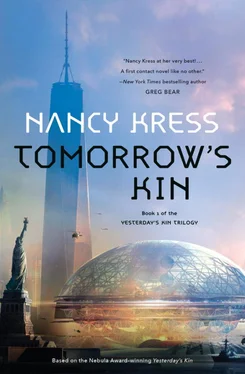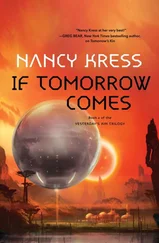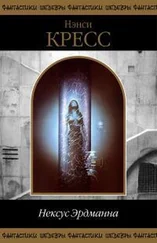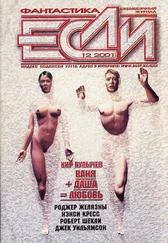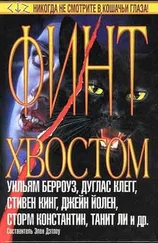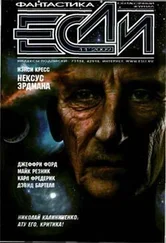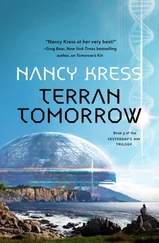But—it would happen only if those who wanted it worked hard to convince the rest. Worked, in fact, as hard at urging friendship as they had at ensuring survival. Was that possible? Could it be done?
Why are you here?
To make contact with World. A peace mission.
She gazed up at the multicolored dawn sky, but the ship was already out of sight. Only its after-image remained in her sight.
“Harrison,” Marianne said, and felt her own words steady her, “we have a lot of work to do.”
Man is always prey to his truths. Once he has admitted them, he cannot free himself from them.
—Albert Camus
S plus 2.6 years
Marianne stood in a small storage room somewhere in the DeBartolo Performing Arts Center at the University of Notre Dame, waiting to go on stage and staring at eight mice.
They were, of course, dead. These eight, however, looked unnervingly lifelike, superb examples of the taxidermist’s art. Why were they here, meeting her gaze with their shiny lifeless eyes from behind the glass of a tiered display case? Had they been moved to this unlikely venue from another building, to sit among cardboard cartons and discouraged-looking mops, because someone could no longer bear to be reminded of what had been lost?
Sissy Tate, Marianne’s assistant, stuck her head into the room. “Ten minutes, Marianne. Are those mice? Wow, it’s stuffy in here.”
“No windows. What about the—”
“They should have put you in the green room! Or at least a dressing room!” Sissy shook her frizzy cherry-red curls, which leaped around her head as if electrified. Two weeks ago the curls had been the same rich brown as her skin. Today’s sweater, purple covered with tiny mirrors, glittered.
Marianne said, “There’s a concert setting up in the big hall. No space.”
“That’s not the reason and we both know it. But at least you don’t have to worry about the storm—this one is going to miss South Bend. No problem.” Sissy’s head disappeared, and Marianne went back to contemplating mice.
Eight representatives of what had been the world’s most common herbivore, now existing nowhere in the world except for a few sealed labs.
Mus musculus and Mus domesticus, their pointed snouts and scaly tails familiar to anyone who ever baited a mousetrap or worked in a laboratory.
A deer mouse and a white-footed mouse, almost twins, looking like refugees from a Disney cartoon.
On the second glass shelf, the shaggy, short-tailed meadow vole and its cousin, the woodland vole.
A bog lemming, its lips drawn back to show the grooves on its upper incisors.
And finally, a jumping mouse, looking lopsided with its huge hind feet and short forelimbs.
“Hey,” Marianne said to the jumping mouse, of which no specimens had been saved. “Sorry you’re extinct.”
“You talking to a mouse?” a deep voice said behind her.
Marianne turned to Tim. “I didn’t hear you come in.”
“Yeah, well, I came to say we might have a problem.”
“But Sissy just said—”
“No, not the storm. Your speech. But first—were you talking to those mice ?”
At Tim’s grin, Marianne felt herself flush. He often had that effect on her; she knew it; she was profoundly grateful that Tim Saunders did not. He lived with Sissy, he was fifteen years her junior, and he was not all that bright. To be so affected on a visceral level by someone so inappropriate was deeply embarrassing to Marianne. The powerful lean body, mahogany hair, bright turquoise eyes that made her feel as if she stood in a blue spotlight—none of this should set her hormones on high alert, not at her age. She was a grandmother twice over, for chrissake. And she lived with Harrison Rice, contentedly.
Contentedly but not passionately, said the rebellious part of her that was still seventeen. Marianne, a long way from seventeen, was appalled at that part of herself. Surely by now all adolescent fogs of desire should have evaporated from her emotions, from her mind, from her—
“I was not talking to the mice,” she said with what she hoped was dignity.
“Sure looked like it.” Another too-masculine grin. Damn, damn, damn. If she had to still feel the fog, why for such an obvious, even clichéd, pretty boy? Not that Tim was only that.
She said, “What’s the problem with my speech?”
“The crowd for it. They look nasty.”
Marianne frowned. Notre Dame was not supposed to be one of the nasty crowds. A noted research center, the university was pro-science, and although still Catholic-conservative on a few issues, had a socially liberal faculty and, mostly, student body. The university had even reimbursed her travel expenses, which few of her speech venues did. “How nasty?”
“Can’t tell yet. But I’m on it.” Tim left.
In the last two and a half years, Marianne had given over five hundred speeches for the Star Brotherhood Foundation, which she and Harrison had founded almost as soon as the alien ship had lifted off, taking Noah and nine other Terrans with it. The foundation’s purpose was to convince the world that a spaceship should be built, using the plans that the aliens had gifted, to take to humanity to the stars.
At first, the foundation had gone well. The spore plague had been mild, with fewer Americans than expected getting sick, fewer still dying. The world’s physicists, engineers, visionaries had all agreed with her. Humanity was going to the stars! Public opinion had been sharply divided, but Marianne and Harrison had been hopeful.
Then two things happened. First, morbidity and mortality reports came from Central Asia. Some anomaly in a genome common to that part of the world caused far more deaths from R. sporii than anywhere else. Horrific deaths, gasping for air, drowning in fluids in their lungs. There was still neither vaccine nor gene therapy for R. sporii, and the spores were apparently going to be present on Earth forever, affecting each new generation. Harrison’s team had developed a postinfection treatment for the disease, but it was expensive and distribution in Russia and her neighbors was sporadic and spotty. Already beset by ethnic unrest, the countries of the former Soviet Union attacked each other with irrational blame. Hard-liners took leadership in half a dozen countries. Hatred of Denebs, skillfully fanned for political purposes, flourished in Russia, in Ukraine, in Kazakhstan and Turkmenistan and Uzbekistan.
Simultaneously, eight species of mice died.
Who knew that the loss of a bunch of rodents could collapse the world economy? Certainly Marianne hadn’t known, but like everyone else, she learned rapidly. An ecology, as Ryan had been telling her for over a decade, was a fragile construct. Alter one major element in it, and everything else was disturbed. Those common and ubiquitous mice were—had been—a major element.
Without the mice, predators from hawks to bears did not have enough to eat. Some died; some shifted to eating such alternate prey as snakes. The snake population shrank, and their prey, such as rats and lizards, flourished. Rat-borne diseases were now rampant. Arctic wolves starved.
Without the mice to eat their seeds, some wild plants went unchecked, growing completely out of control and choking off their less hardy neighbors, which further affected their ecosystems.
Without the mice to disperse their seeds, some flora began to disappear.
Without the mice to eat insects, some species flourished, including cockroaches, some caterpillars, some beetles.
Without the mice, which in some parts of the world had eaten huge amounts of cultivated grain, farmers suddenly had bumper crops. The supply glut caused prices to plummet. Whole economies tottered.
Читать дальше
